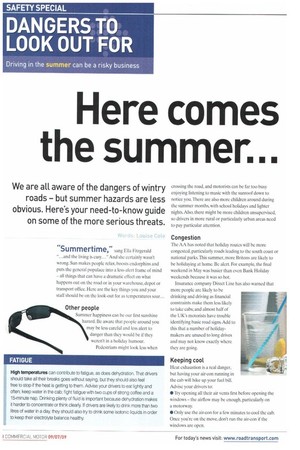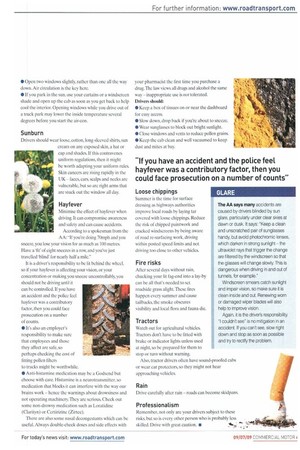Here comes the summer...
Page 48

Page 49

If you've noticed an error in this article please click here to report it so we can fix it.
We are all aware of the dangers of wintry roads but summer hazards are less obvious. Here's your need-to-know guide on some of the more serious threats.
"Sunnmertim
e sang Ella Fitzgerald "...and the living is easy..." And she certainly wasn't wrong. Sun makes people relax, boosts endorphins and puts the general populace into a less-alert frame of mind — all things that can have a dramatic effect on what happens out on the road or in your warehouse, depot or transport office, Here are the key things you and your staff should be on the look-out for as temperatures soar...
Other people
Summer happiness can be our first sunshine hazard. Be aware that people around you may be less careful and less alert to danger than they would be if they weren't in a holiday humour. Pedestrians might look less when
crossing the road, and motorists can he far too busy enjoying listening to music with the sunroof down to notice you. There are also more children around during the summer months, with school holidays and lighter nights. Also. there might be more children unsupervised, so drivers in more rural or particularly urban areas need to pay particular attention.
Congestion
The AA has noted that holiday routes will be more congested, particularly roads leading to the south coast or national parks. This summer, more Britons are likely to be holidaying at home. Be alert. For example, the final weekend in May was busier than even Bank Holiday weekends because it was so hot.
Insurance company Direct Line has also warned that more people are likely to be drinking and driving as financial constraints make them less likely to take cabs; and almost half of the UK's motorists have trouble identifying basic road signs. Add to this that a number of holidaymakers are unused to long drives and may not know exactly where they are going.
Keeping cool
Heat exhaustion is a real danger, but having your air-con running in the cab will hike up your fuel bill. Advise your drivers to: • Try opening all their air vents first before opening the windows — the airflow may be enough, particularly on a motorway • Only use the air-con for a few minutes to cool the cab. Once you're on the move, don't run the air-con if the windows are open. • Open two windows slightly, rather than one all the way down. Air circulation is the key here.
• If you park in the sun, use your curtains or a windscreen shade and open up the cab as soon as you get back to help cool the interior. Opening windows while you drive out of a truck park may lower the inside temperature several degrees before you start the air-con.
Sunburn
Drivers should wear loose, cotton, long-sleeved shirts, sun cream on any exposed skin, a hat or cap and shades. If this contravenes uniform regulations, then it might be worth adapting your uniform rules. Skin cancers are rising rapidly in the UK — faces, ears, scalps and necks are vulnerable, but so are right arms that are stuck out the window all day.
Hayf ever
Minimise the effect of hayfever when driving. IL can compromise awareness and safety and can cause accidents, According to a spokesman from the A A:"If you're doing 70mph and you sneeze, you lose your vision for as much as 100 metres. Have a 'fit' of eight sneezes in a row, and you've just travelled 'blind' for nearly half a mile."
It is a driver's responsibility to be fit behind the wheel, so if your hayfever is affecting your vision, or your concentration or making you sneeze uncontrollably, you should not be driving until it can be controlled. If you have an accident and the police feel hayfever was a contributory factor, then you could face prosecution on a number of counts.
• It's also an employer's responsibility to make sure that employees and those they affect are safe, so perhaps checking the cost of fitting pollen filters to trucks might be worthwhile, • Anti-histamine medication may be a Godsend but choose with care. Histamine is a neurotransmitter, so medication that blocks it can interfere with the way our brains work — hence the warnings about drowsiness and not operating machinery. They are serious. Check out some non-drowsy medication such as Loratidine (Clarityn) or Certirizine (Zirtee).
There are also some nasal decongestants which can be useful. Always double-check doses and side effects with your pharmacist the first time you purchase a drug. The law views all drugs and alcohol the same way — inappropriate use is not tolerated_ Drivers should: • Keep a box of tissues on or near the dashboard for easy access.
• Slow down, drop hack if you're about to sneeze, • Wear sunglasses to block out bright sunlight.
• Close windows and vents to reduce pollen grains.
• Keep the cab clean and well vacuumed to keep dust and mites at bay.
Loose chippings
Summer is the time for surface dressing as highways authorities improve local roads by laying tar covered with loose chippings. Reduce the risk of chipped paintwork and cracked windscreens by being aware of road re-surfacing work, driving within posted speed limits and not driving too close to other vehicles.
Fire risks
After several days without rain, chucking your lit fag-end into a lay-by can be all that's needed to set roadside grass alight. These fires happen every summer and cause tailbacks, the smoke obscures visibility and local flora and fauna die.
Tractors "I couldn't see" is no mitigation in an
Watch out for agricultural vehicles. accident. If you can't see, slow right Tractors don't have to be fitted with down and stop as soon as possible brake or indicator lights unless used and try to rectify the problem.
at night, so be prepared for them to stop or turn without warning.
Also, tractor drivers often have sound-proofed cabs or wear ear protectors, so they might not hear approaching vehicles.
Rain
Drive carefully after rain — roads can become skidpans
Professionalism
Remember, not only are your drivers subject to these risks, but so is every other person who is probably less
skilled. Drive with great caution. • Al&












































































































































